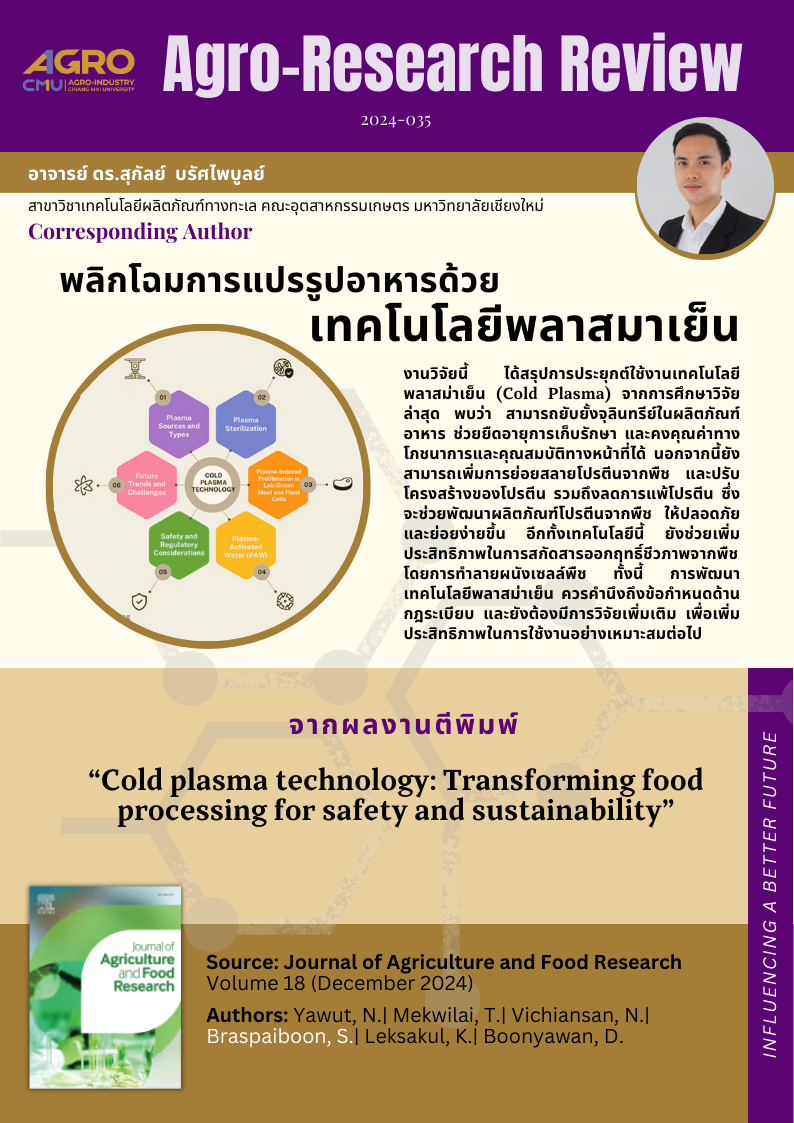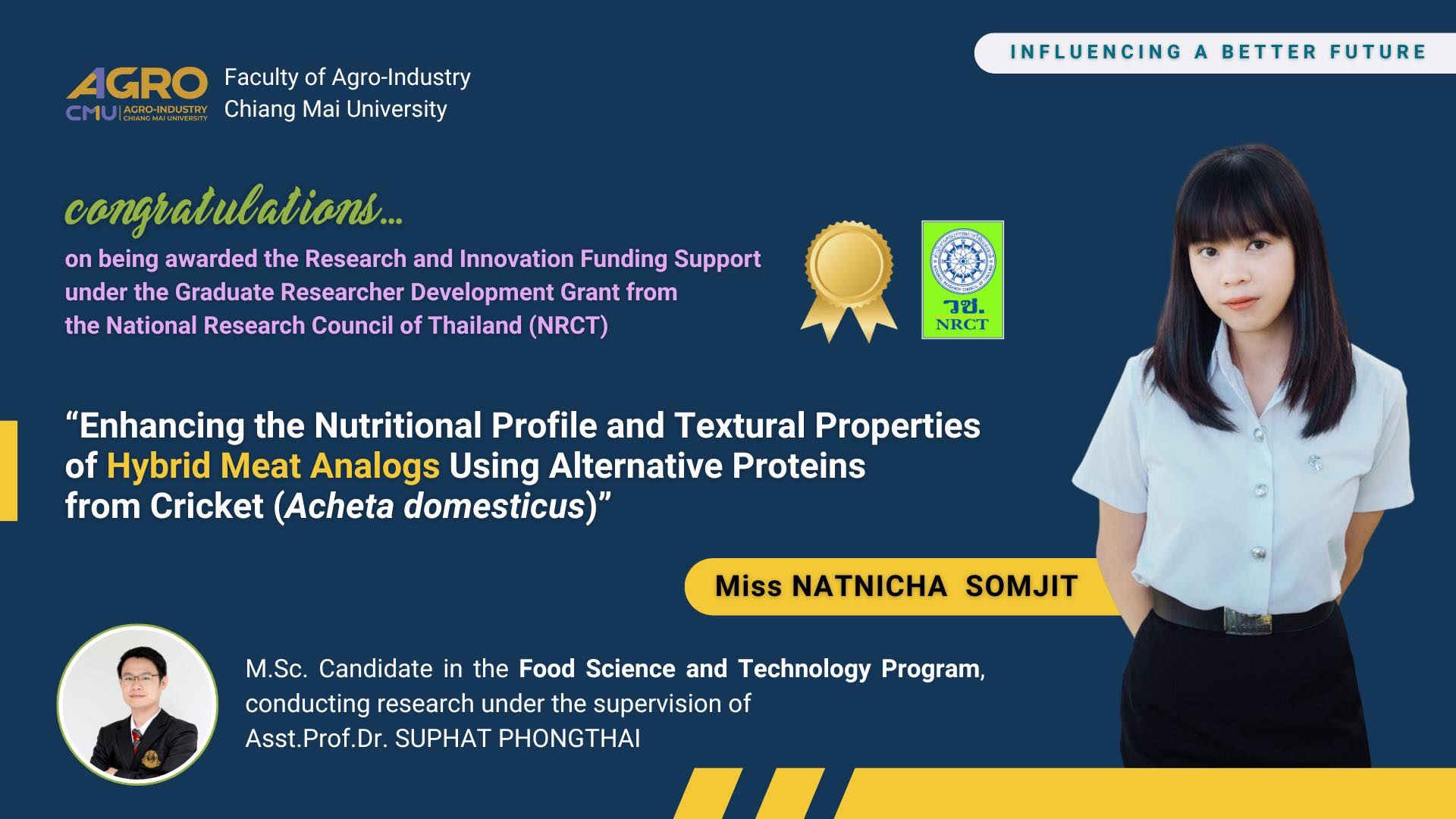
แนะนำงานวิจัย 2024-035 พลิกโฉมการแปรรูปอาหาร ด้วยเทคโนโลยีพลาสมาเย็น
งานวิจัยนี้ ได้สรุปการประยุกต์ใช้งานเทคโนโลยีพลาสม่าเย็น (Cold Plasma) จากการศึกษาวิจัยล่าสุดพบว่า สามารถยับยั้งจุลินทรีย์ในผลิตภัณฑ์อาหาร ช่วยยืดอายุการเก็บรักษา และคงคุณค่าทางโภชนาการและคุณสมบัติทางหน้าที่ได้ นอกจากนี้ยังสามารถเพิ่มการย่อยสลายโปรตีนจากพืช และปรับโครงสร้างของโปรตีน รวมถึงลดการแพ้โปรตีน ซึ่งจะช่วยพัฒนาผลิตภัณฑ์โปรตีนจากพืชให้ปลอดภัยและย่อยง่ายขึ้น อีกทั้งเทคโนโลยีนี้ ยังช่วยเพิ่มประสิทธิภาพในการสกัดสารออกฤทธิ์ชีวภาพจากพืชโดยการทำลายผนังเซลล์พืช ทั้งนี้ การพัฒนาเทคโนโลยีพลาสม่าเย็น ควรคำนึงถึงข้อกำหนดด้านกฎระเบียบและยังต้องมีการวิจัยเพิ่มเติมเพื่อเพิ่มประสิทธิภาพในการใช้งานอย่างเหมาะสมต่อไป
This research summarizes the application of Cold Plasma Technology in food processing. Recent studies have shown that cold plasma can effectively inhibit microorganisms in food products, extending shelf life while preserving nutritional value and functional properties. Additionally, cold plasma enhances the digestibility of plant-based proteins by facilitating protein breakdown, modifying protein structures, and reducing allergenicity. This contributes to the development of safer and more easily digestible plant-based protein products.
Topic: Cold plasma technology: Transforming food processing for safety and sustainability
Authors: Yawut, N.| Mekwilai, T.| Vichiansan, N.| Braspaiboon, S.| Leksakul, K.| Boonyawan, D.
Abstract:
Cold plasma (CP) technology has emerged as a promising non-thermal method with diverse applications in the food industry, offering solutions to key challenges related to food safety, preservation, and quality enhancement. This paper provides a comprehensive overview of the multifaceted applications of CP technology, including microbial inactivation, improvement of plant-based protein digestibility, functional property enhancement, allergenicity reduction, and bioactive compound extraction. Through an examination of recent research findings, we explore the effectiveness of CP treatment in inhibiting microorganisms in various food products, extending shelf life, and preserving nutritional and functional qualities. Additionally, we highlight the potential of CP technology to enhance the digestibility of plant-based proteins by overcoming anti-nutritional factors and modifying protein structures. Furthermore, we discuss how CP treatment can improve the functional properties of proteins and reduce allergenicity, paving the way for the development of safer and more digestible plant-based protein products. Moreover, we examine the role of CP technology in the extraction of bioactive compounds from plant materials, showcasing its ability to disrupt plant cell walls and enhance extraction efficiency. Finally, we address regulatory considerations and the future outlook for CP technology in the food industry, emphasizing the need for continued research and development efforts to optimize its use while ensuring compliance with regulatory standards. Overall, CP technology holds significant promise for revolutionizing food processing and preservation, driving innovation, and meeting the evolving needs of consumers worldwide.
Keywords: Bioactive compound extraction; Cold plasma technology; Food industry; Microbial inactivation; Plant-based proteins
View at publisher: https://www.sciencedirect.com/science/article/pii/S2666154324004204?via%3Dihub#sec8
#อกมช. #agrocmu #CMU




